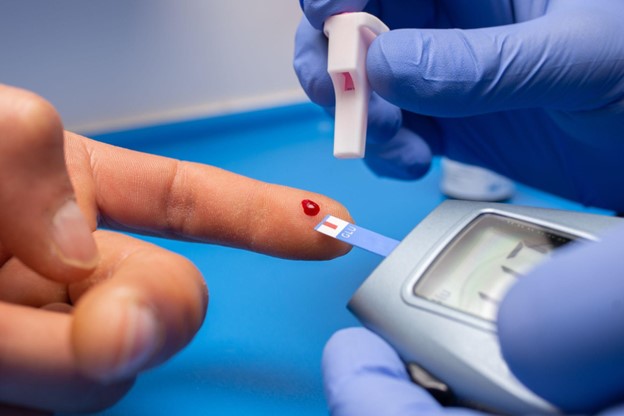What Causes Morning Spikes in Blood Sugar and How to Avoid Them It is common for many people with diabetes or prediabetes to worry about having high blood sugar levels in the morning. You might wake up to discover that your blood sugar is higher than expected, even though you didn’t eat anything overnight. While this can be frustrating, understanding the science behind it can help you manage it more effectively. Let’s investigate the reasons for morning spikes in blood sugar and the steps you can take to avoid them.
When I wake up, why is my blood sugar so high?
Your blood sugar levels may rise in the morning for a few main reasons, most of which are caused by a natural phenomenon known as the Dawn Phenomenon.
Phenomenon of Dawn: Your body starts releasing hormones like cortisol and growth hormone in the early morning, typically between 2 a.m. and 8 a.m. These hormones can increase insulin resistance, meaning your body has a harder time processing glucose. Sugar levels in the blood can rise as a result. Somogyi Effect (Rebound Hyperglycemia): This happens if you have hypoglycemia (low blood sugar) at night, which may cause your body to release hormones that counter-regulate (like adrenaline) to raise blood sugar levels. While this is your body’s protective mechanism, it can sometimes result in a blood sugar spike in the morning.

How Do I Stop My Blood Sugar From Spiking in the Morning?
Changing your lifestyle, diet, and medication regimen are all necessary for controlling blood sugar in the morning. Here are some helpful hints:
Regularly check your blood sugar: Keeping track of your blood sugar before bed and first thing in the morning helps you identify patterns. This can help you make adjustments to your insulin regimen, exercise routine, or eating habits.
Dinner Snack: A small, balanced snack before going to bed can help maintain stable blood sugar levels all night for some people. A small serving of cheese or a handful of nuts can provide a slow, steady release of energy while you sleep, preventing significant fluctuations in blood sugar. Another snack that contains protein and healthy fats is cheese.
Reduce Stress: Cortisol levels can rise as a result of stress, which can also raise blood sugar. Using techniques like deep breathing, meditation, or yoga to reduce stress can help lower cortisol levels and prevent spikes in blood sugar.
Regular exercise: Your body’s ability to process glucose more efficiently and insulin sensitivity are both enhanced by regular physical activity. A brisk walk or light exercise in the evening may help stabilize blood sugar levels overnight.
Adjust Medications (If Applicable):
If you’re on medication for diabetes, your doctor may need to adjust the timing or dosage of your medication to prevent morning spikes. In order to keep your blood sugar levels under control while you sleep, insulin or oral medications may be required.
What is the 15-Minute Rule for Diabetes?
A method for controlling hypoglycemia (low blood sugar) in diabetics is referred to as the “15-Minute Rule.” If your blood sugar drops too low, the rule suggests consuming 15 grams of fast-acting carbohydrates (like glucose tablets, juice, or candy) and waiting 15 minutes to see if your blood sugar rises to a safe level. Your blood sugar won’t rise too quickly or overcompensate as a result of this straightforward rule.
How Can I Flush Sugar Out of My System Fast?
While there is no instant method to “flush” sugar out of your system, certain lifestyle changes can help your body process and eliminate excess sugar more efficiently:
Hydration: Drinking a lot of water can help your body metabolize glucose and flush out excess sugar through urine. This improves kidney function.
Exercise: Physical activity helps your muscles use glucose more effectively, which can assist in lowering blood sugar levels. After meals, a short walk can be especially beneficial.
Fiber-Rich Foods: Consuming foods high in fiber can assist in balancing blood sugar levels and slow the absorption of sugar. Whole grains, fruits, vegetables, and legumes are excellent options.
What Brings Sugar Down Immediately?
A few things you can do to quickly lower your blood sugar levels are as follows:
Insulin: In order to lower your blood sugar levels, you may need to take a correction dose of insulin. Always follow your doctor’s advice on insulin usage.
Physical Activity: One of the quickest ways to lower blood sugar is through exercise. Your body can process glucose more efficiently with even a short walk or light workout.
Consuming Water: By flushing excess glucose out of your body through urine, drinking water can speed up the process of lowering blood sugar levels.
Is lemon water a sugar flushing agent?
Lemon water may not “flush out” sugar directly, but it can help control blood sugar levels. Lemon has a low glycemic index and is high in vitamin C, which can help improve insulin sensitivity. Although lemon water on its own will not significantly lower blood sugar, it can be a healthy and hydrating option for supporting overall blood sugar control. Additionally, the acidity of lemon water may contribute to a more stable blood sugar level by sloweding the absorption of sugar from meals. It’s always a good idea to incorporate lemon water into a healthy diet as part of a holistic approach to managing blood sugar.
Conclusion:-
Morning blood sugar spikes can be frustrating, but understanding why they happen and how to prevent them can make a big difference in managing your health. By making small adjustments to your lifestyle, diet, and medication regimen, you can prevent these spikes and maintain better overall blood sugar control. Always consult with your healthcare provider for personalized guidance tailored to your needs.